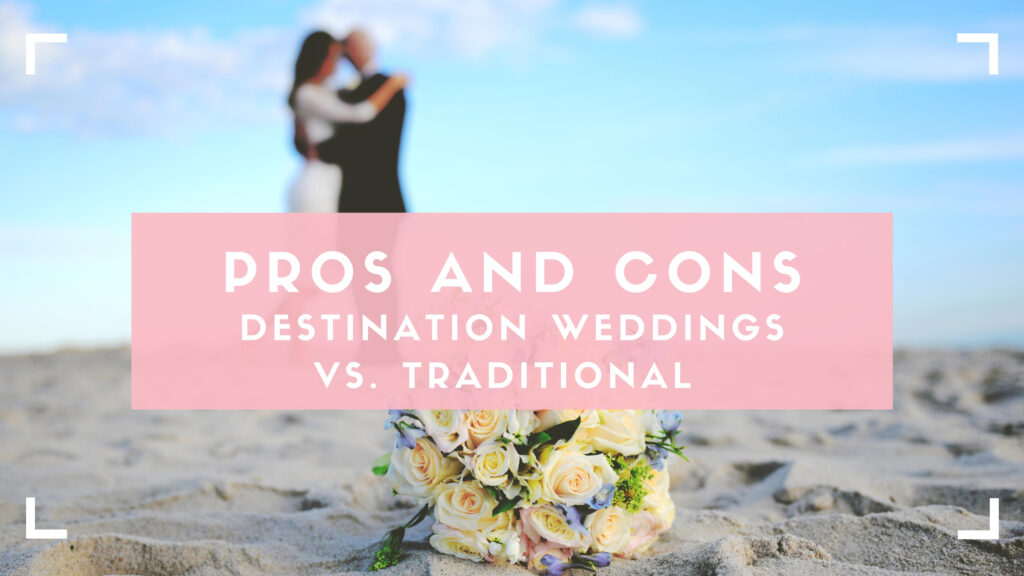When clients are trying to decide on the type of wedding they want, two of the big options are traditional and destination. COVID-19 issues aside for a moment, these two types of wedding are always in demand. But what’s important to the clients? Have they considered destination wedding cost, or the need for maintaining tradition?
When people think of weddings, there is typically a formula they have in mind, including things like a big, white dress, a church, flower bunting, and a long night of dancing to ‘80s pop ballads. Traditional weddings are popular for a reason. They are time tested and what a lot of people still expect from their nuptials.
On the other hand, destination weddings are generally seen as exotic and fanciful, as being way out of people’s price range. They are usually on some tropical island with the wind blowing through their hair. Compared to traditional weddings, they are also an entirely different ball game to plan.
So how can you help your couple make the difficult decisions between the exotic and the tradition? Between high destination wedding costs, and the allure of an at-home conventional party?
There is Comfort in the Conventional

As much as people want their wedding to be unique and tailored, there is something less stressful about typical traditional weddings. Some brides may feel so overwhelmed by the choices, that a traditional wedding may be just what they needs.
Traditional weddings have a formula. There is the ceremony at a church with flowers and music, reception at a hotel ballroom or hall with a DJ, and a seated dinner. Add in the dress, the cake, photography hour, and some party favors, and you’ve got yourself a traditional wedding.
Traditional weddings typically cost a certain amount, ranging between $10,000 and $50,000. The average, according to The Knot is $33,900. This allows for you, as the coordinator, to have a clear budget plan from the get go. If you’ve done one of these types of weddings, you know the drill.
Traditional weddings will spend a third of their budget on the venue, at least another third on food, and the rest on everything from florals to the dress and photographer. If the venue and food are incredibly important to the couple, then a conventional wedding is the way to go.
But, if you are seeing the couple is a bit more flexible and adventurous, maybe they will want something more exciting.
Destination Wedding Cost: It Can Actually Cost Less!
We know what you’re thinking: Surely this can’t be true.
But it really can be. The destination wedding cost can come in below the cost of a traditional wedding. And, potentially by a lot. It’s all in how you plan, especially when it comes to the venue.
If your clients are looking for a tropical locale, they are going to get the best bargain for their buck, at least when it comes to the United States. Beach weddings only require a permit. No giant venue cost with electricity and staff to worry about, just the beach and a permission slip to be there (and liability insurance). That’s it.
Many beach permits have a set time limit, typically not exceeding two hours. Most beach ceremonies wouldn’t last that long anyway, but it is an important thing to note when talking about arranging a permit for your clients. Making sure they have liability insurance is a must as well, and often a requirement.
Destination weddings cut down the guest list by an average of one third. That can be a considerable cost saver depending on your clients’ families. Big families mean big price tags, especially when they don’t want to offend anyone.
By having a destination wedding, it is only natural a large number of people wouldn’t be able to come, allowing clients to chisel down their guest list to only those who they truly want to be there.
Plus, this is going to save your clients a huge amount when it comes to food and drink. Regardless if they go to an all-inclusive resort or something smaller and more intimate, the cost of feeding guests at a destination wedding will be way less than a traditional sit-down dinner.
The Allure of the All-Inclusive Wedding Package
How to plan a destination wedding and cut costs at the same time? One great way is an all-inclusive wedding package at a resort or hotel. This will often contain everything the couple needs: the venue, food, drinks, decor, and an officiant. It may even include the permits and insurance. These sort of packages seriously cut down on the stress of planning and don’t empty your clients’ bank account.
If your couple is really wanting to dial down on the cost of a destination wedding, have them consider eloping. With an elopement, they will not only be seriously cutting the price tag but also the stress. No giant reception to deal with, no running around making sure everything is perfect, and no stress about the guestlist. It’ll just be two people who love one another.
The Complexities of Planning: Traditional vs. Destination
Let it be said that planning a wedding is never a simple task. That’s why it is vital, as a wedding planner, to stay as organized as possible. This is especially true when it comes to helping your clients decide what kind of wedding is the best fit.
Destination weddings can be tricky to plan, there is no doubt about that. If you haven’t been to the destination itself, you’ll want to go there to familiarize yourself with local vendors, venues, and anything else that may be pertinent for clients. This can be easier said than done, especially if one couple wants a wedding in Paris and another in Jamaica.
Destination Wedding Cost Considerations

Many destination wedding costs come down to flights and lodging, and planning those out for your clients will require some travel agent expertise, or at least a great contact with one to get the best deals. Have your couples budget at least $1,000 each for flights and up to $4,000 for a 5 or 6-night stay at a hotel with a wedding package.
Navigating wedding packages at hotels is a whole other aspect of planning destination weddings. There are a lot—some all inclusive, some just offering the ceremony and officiant. Knowing the details of each and which is best suited is vital to your success at planning a destination wedding.
Weather and Seasonal Issues
One major thing to watch out for when it comes to destination weddings, however, is the weather. You don’t want to plan a beautiful Caribbean wedding in the middle of hurricane season. Alternatively, maybe avoid a wedding in the Swiss Alps in December.
Legal Considerations
Another potential issue is the legalities of marriage in certain locales. There are different requirements in every country regarding marriage. If the couple wants to have a legal marriage in a foreign country, make sure they are aware of the paperwork and other requirements they may need for it to be binding. A way to get around that is to do the paperwork at home and just have a symbolic ceremony abroad.
Are Traditional Weddings Easier to Plan?
On the flip side, traditional weddings can be more formulaic and easier to plan. Unless your couple wants things themed or have very specific requests, these weddings tend to be less stressful from a logistics point of view. Not that they’re easy—even micro weddings can be hard—but they may not make you bite your nails quite as much as a destination wedding.
What does get complex about traditional weddings relates to guest lists, food, and the reception. Conventional weddings are bigger, which means more people, more to take care of, and more money overall. Knowing where to seat people, if venues can accommodate everyone, and how many courses to serve due to dietary restrictions are just some of the things to factor in.
Balancing Out the Pros and Cons
In the end, whichever type of wedding a client wants, it is your job as a wedding planner to give them the best experience possible. Understanding the complexities of a destination wedding versus the potential cost saving is important to not only know, but to convey to your clients. Maybe they had never thought of going abroad or even to another state.
Likewise, if a couple is dead-set on going abroad but just seems to be lost or treading water, maybe suggesting a traditional wedding for the ceremony and then going abroad for their honeymoon would be in their best interest.
It’s all about understanding your clients and their wants but also recognizing their needs, even if they can’t see them themselves. After all, that’s your job!













